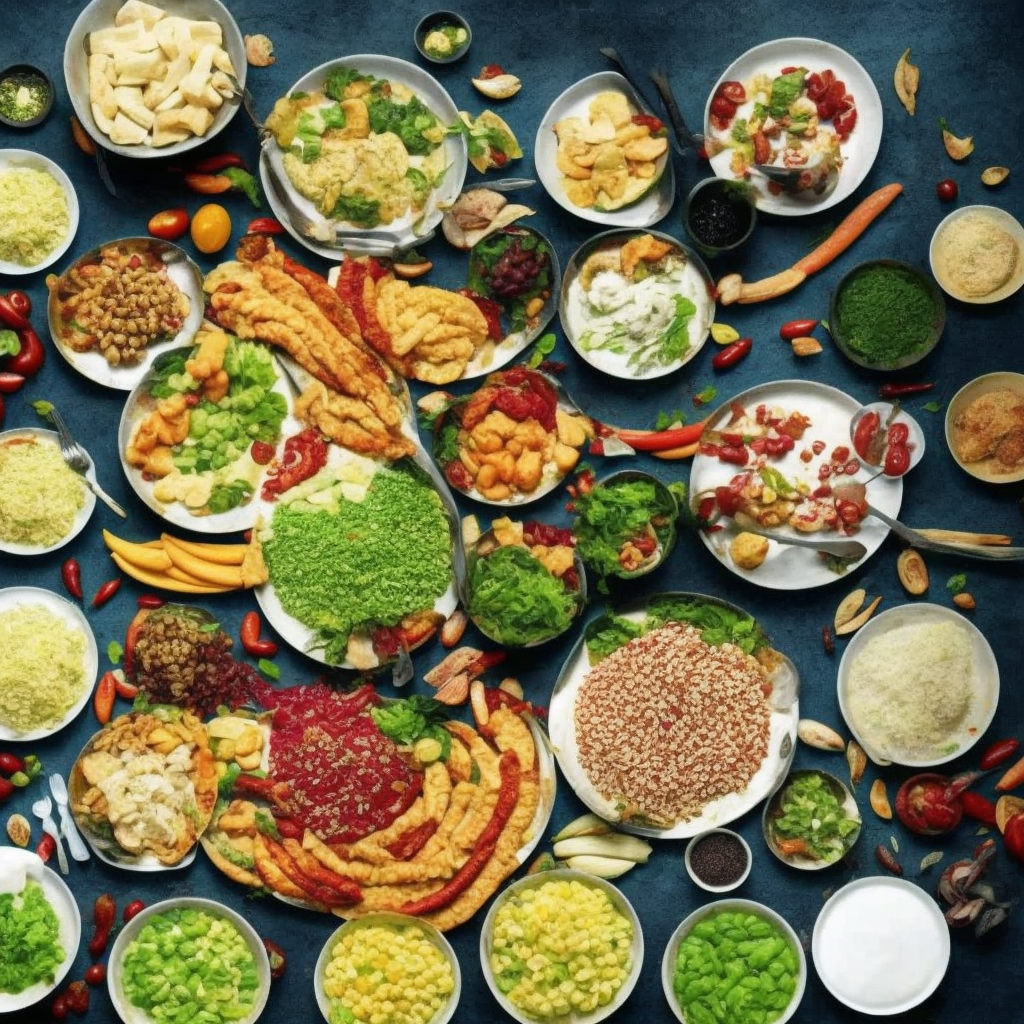Global Nosh: The Health Secrets of Traditional Diets Worldwide
Unwrap the delicious mysteries of our global pantry as we embark on a salubrious culinary adventure to explore "Global Nosh: The Health Secrets of Traditional Diets Worldwide". We are about to whisk you off on a palate-pleasing journey, traversing the tantalizing terrains of far-flung cultures, feasting on traditional foods woven into the fabric of their rich histories.
Beyond the burst of flavors, we will unravel the symphony of health benefits that these feasts camouflaged as day-to-day meals offer. Buckle up, as we get ready to feast our way to good health, from the sun-dappled Mediterranean basin to the bustling street markets of Asia, the vibrant spice bazaars of the Middle East to the lush Amazonian rainforests. Get ready to discover how food, culture, and health combine in an exquisite meze of global wellness secrets.
Table of Contents
- Unearthing the Health Treasures Hidden in Traditional Diets Around the Globe
- Decoding the Nutritional Rituals of Ancient Cultures
- Top International Dietary Practices for Optimal Health
- From Theory to Plate: Applying Global Dietary Wisdom for Maximum Wellbeing
- Q&A
- The Conclusion
Unearthing the Health Treasures Hidden in Traditional Diets Around the Globe
Unlocking Nutritional Wisdom From Our Ancestors
Travelling across the timeline and around the globe, we can uncover a myriad of traditional diets, each with their unique charms and intrinsic health benefits. Each culture, in its own way, has perfected the art of eating in sync with nature and their specific environments, thanks to time-tested wisdom passed down through generations.
From the Mediterranean diet, revered for its heart-healthy benefits rooted in the consumption of olive oil, fruits and veggies, whole grains, lean proteins, and red wine, to the Japanese diet, synonymous with longevity, thanks to seafood, tofu, minimal dairy, and abundance of fermented foods. The Maasai tribe of Africa boasts dietary cuisine rich in lean meats, dairy, fruits, and vegetables, while the eating habits in Bali make ample use of nutrient-rich rice, vegetables, a variety of seafoods, along with a multitude of spices. And let’s not forget the ancient Aztec diet, laden with protein from beans, vitamin-loaded amaranth grain, and all the benefits brought by the beloved cacao bean!
From these traditional diets, it’s clear that a balanced, varied diet, rich in whole foods, fruits, vegetables, lean meats, and locally sourced ingredients has stood the test of time. Truly, there’s a world of wisdom in our ancestors’ eating habits, and it’s high time we started rediscovering these health treasures.
Decoding the Nutritional Rituals of Ancient Cultures
Just like language, the culinary practices, tools, and traditions developed by cultures far and wide are rich tapestries woven by time itself. Even as diets have modernized, there is an abundance of insight that can be gleaned from examining the nutritional habits of ancient societies. By stepping back in the annals of gastronomical history, we can uncover wisdom that can help shape healthier, more sustainable eating practices today.
Let’s embark on a culinary journey to explore some notable ancient diets from across the globe. The traditional Japanese diet, sharply characterized by its simplicity, celebrates fresh, seasonal produce, fish, and seafood while minimizing animal fat and sugar. Believing in the medicinal properties of food, the Japanese meal is more than sustenance—it’s a path to wellness. The Mediterranean Diet, famously heart-healthy, emphasizes fruits, vegetables, whole grains, and olive oil, along with moderate fish and poultry intake. Oldways from Africa are a potpourri of richly diverse diets that stick to plant-based foods, legumes, whole grains, and healthy fats. These diets not only foster health but also build a strong connection to the earth and its seasons.
Top International Dietary Practices for Optimal Health
Without a doubt, the journey towards optimal health is not just about what we avoid, but it’s about embracing diverse food cultures and traditions. Here’s a glimpse into some healthy dietary habits practiced around the globe. Japan is known for its diet rich in fish, rice, soy, vegetables, and fruit, all low in saturated fats, which significantly contributes to their good cardiovascular health and longevity. The Mediterranean diet, on the other hand, with its focus on whole grains, olive oil, fish, fruits, vegetables, and moderate wine consumption, is known for its heart-healthy properties, and aiding in weight loss and blood sugar control.
Over in Scandinavia, the New Nordic Diet promotes local, sustainable, and minimal processed food with plenty of seafood, whole grains, root vegetables, and berries, supporting biodiversity and boosting health. The ancient, plant-heavy Ayurvedic Diet of India is not just a way of eating, but a holistic approach to health, focusing on maintaining balance in the body. Frequent meals including complex carbohydrates, protein, fiber, healthy fats, vitamins, and minerals in the Mexican diet show their emphasis on balanced intake to keep the body nourished and healthy. These dietary practices do not just nourish the physical body, but they also enhance our emotional and spiritual wellness, giving a perfect panacea for holistic well-being.
From Theory to Plate: Applying Global Dietary Wisdom for Maximum Wellbeing
Embracing Culinary Diversity
Around the globe, there exists a diverse tapestry of cuisines that not only offer a tantalizing delight for our taste buds but also contain secret recipes for health and wellbeing. Taking cues from traditional diets worldwide, it’s possible to infuse an exotic flavor to our meals and at the same time, reap benefits for our health. Understanding and applying these dietary practices can enrich and balance our daily consumption. For example, the biodiverse diet of Okinawa, an island in Japan, emphasizes seasonality, diversity, balance and plant-based food rich in antioxidants. Meanwhile, the Mediterranean diet is renowned for its richness in heart-healthy olive oil, lean proteins, fruits, vegetables and whole grains.
Unleashing the Global Pantry
To integrate global diets into our meals, we can focus on some universally recognized elements that traditional diets incorporate to maintain health and establish harmony with nature:
- Whole, unprocessed foods: Traditional diets around the world favor whole grains, fruits, vegetables, and lean proteins that are minimally processed and rich in nutrients.
- Fermented foods: From the Korean kimchi to the German sauerkraut, fermented foods are a regular feature in traditional diets. They are not only probiotic-rich but also assist in better nutrient absorption.
- Seasonal and locally-sourced foods: Traditional diets are heavily influenced by what is available locally and seasonally. This not only promotes fresh and nutrient-dense intake but also conserves the environment.
Culinary heritage is filled with well-being wisdom, which we can all tap into. By understanding and applying the global dietary wisdom, we can elevate our plates to a wholesome, nutritious, and flavorful experience. Embarking on this global culinary journey not only honors our interconnected food culture but also empowers us towards maximum wellbeing.
Q&A
Q1: What exactly does “Global Nosh” refer to?
A1: “Global Nosh” is a term we’ve coined to describe the exploration and appreciation of traditional diets from all around the world. It involves delving into the health benefits these diets offer, their unique characteristics, and their cultural significance.
Q2: Are these traditional diets beneficial for everyone?
A2: Though the health benefits of traditional diets are widely recognized, it’s crucial to remember that what works for one might not work for another. Everybody is unique, and our individual nutritional needs vary. However, understanding these diets can provide valuable insights into the principles of balanced and sustainable eating.
Q3: How do traditional diets contribute to health and wellness?
A3: Traditional diets typically include local, whole, and seasonal foods, and tend to be lower in processed and refined ingredients. Such diets also often reflect sustainable and environmentally friendly farming and fishing practices, which positively impact both personal health and planetary health.
Q4: Which cultures are highlighted in this exploration of Global Nosh?
A4: We take a comprehensive look at a wide array of cultures, from the Mediterranean and its rich olive oil and plant-based diet, to the Japanese and their seafood and fermented foods, the vibrancy of Indian spices, the whole grains abundant in African diets, and the lean meats of Mongolian cuisine, among many others.
Q5: What surprising health secrets might we find in global diets?
A5: The health secrets very much vary from culture to culture. For example, you might get amazed at how many traditional diets teach us the beauty of moderation and the importance of celebrating food as a communal pleasure rather than just a necessity. Many traditional diets also show us the importance of having a diverse range of foods.
Q6: How can these traditional diets be adapted to modern lifestyles?
A6: Incorporating principles from traditional diets into our lives can be as simple as choosing whole foods over highly processed ones, prioritizing plant-based diets, or consciously including a variety of local seasonal foods in our meals.
Q7: Can Global Nosh help address the growing issue of diet-related health problems?
A7: That’s certainly our hope! By re-introducing the wisdom of traditional diets, Global Nosh is not just about discovering exciting new flavors. It’s about shifting the conversation around food to take into account sustainable practices, balanced nutrition and overall wellness, topics that are key in fighting modern diet-related health issues.
The Conclusion
As we conclude our gastronomic journey around the world, we hope that this exploration of distinctive cuisines and their inherent health benefits has enticed your taste buds and broadened your culinary horizons. Traditional diets, deeply embedded in diverse cultures worldwide, offer not only a rich medley of flavors, colors, and textures to savor but also a treasure trove of nutritional benefits to enhance our overall wellbeing. In the wake of modernism, these traditions continue to provide a blueprint for achieving balance in our lifestyles, shedding light on the fascinating interplay between health and the foods we consume daily. Let us, therefore, endeavor to make a conscious shift towards wholesome, balanced, and mindful eating, bringing forth the tangible vitality of these bygone eras into our busy modern lives. After all, centuries of culinary wisdom and health secrets are just a bite away!







